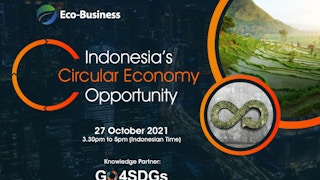
If the linear “take-make-waste” model continues to be the modus operandi for Indonesian businesses, the country is poised to produce a staggering amount of 155.3 million tonnes of waste collectively from five industries — food and beverage, textiles, wholesale retail and trade, construction, and electronics — by 2030 according to a recent report by the Ministry of National Planning and Development Indonesia (BAPPENAS), UNDP, and the Government of Demark.
If Indonesia were instead to adopt a circular economy, it is projected to generate an additional economy-wide GDP of IDR593 to IDR638 trillion, and reduce waste, carbon emissions, and water consumption significantly while creating 4.4 million net cumulative jobs by 2030 — a boost much needed in the post-pandemic recovery.
In support of Sustainable Development Goal 12 (Responsible Production and Consumption), this important dialogue will discuss how the circular economy can enable a more sustainable production life-cycle within and beyond the five industries mentioned above, providing many opportunities for public-private partnerships and collaboration.
Publish your content with EB Publishing
It's about who you reach. Get your news, events, jobs and thought leadership seen by those who matter to you.




